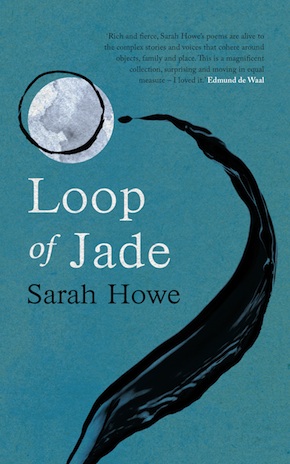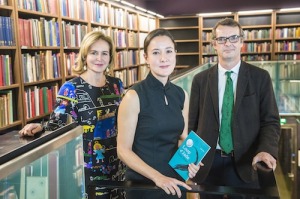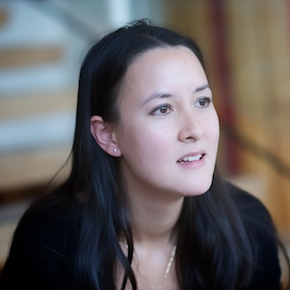Sarah Howe: Remaking memory
by Mark Reynolds
“One of the very best books of poems I have read for a long time — complicated and moving and very accomplished.” New Statesman
On 10 December 2015, Hong Kong-born British poet Sarah Howe was awarded the revived Sunday Times/Peters, Fraser & Dunlop Young Writer of the Year award for her remarkable debut collection Loop of Jade. Also shortlisted for the Forward Prize for Best First Collection and in the running for the T.S. Eliot Prize to be announced early next year*, her poems take on playful variations of form and metre to explore themes of identity, hybridity, memory, marriage and migration. I spoke to her to congratulate her on the win, and to discuss some of the stories and influences behind her work.
MR: The title poem is an intensely personal family story. Could you say a little about that loop of jade?
SH: It’s an object which works in my mind a little bit like the netsuke in Edmund de Waal’s The Hare with Amber Eyes, inasmuch as it’s something that gives you this feeling when you touch it of being in communication with the past and with past generations. It was a gift that my mother’s adoptive mother, the woman who took her in after she was abandoned as a baby, gave to me when I was born, and she took it to the temple to have it blessed. The idea of the jade bracelet that Chinese babies and toddlers wear is that it’s a protective talisman, so if the toddling baby falls over the jade breaks instead of the child being hurt.
How much have you managed to piece together about your mother’s biological parents and the circumstances of her being orphaned?
Almost nothing, and I think it would be an impossible task, really. I don’t know what the status of records would have been, but I imagine almost non-existent, and to be honest my mum doesn’t know much about her origins. Everything she does know is from what her adoptive mother told her, which was pretty minimal. So the circumstances in which she was given up and taken in by this woman are really blurry. She once told her something like, “I saved you from the rubbish heap” but then another time she said her real father was a cobbler, so even whether my adoptive grandmother knew who the parents were isn’t entirely clear.
You do get a sense in some of the poems of her grasping at memories from her childhood, and you really capture that.
That was quite an interesting and difficult business, trying to write those poems, especially the ones later in the book that are in my mum’s voice – which starts to happen in the long title poem as well. In the ‘Loop of Jade’ poem, it’s my effort to set down, with very little change or embellishment, what my mum actually said to me.
Her longest and most empty pause, I’ve learned, comes before the word mother.
As in, My – mother, she could speak Shanghainese. This, one of her trademark non-sequiturs
– at the table the family would laugh – arrived while scraping off dinnerplates several months
after a trip of mine to Shanghai. It’s as though she’s been conducting the conversation in her
head for some time and decides disconcertingly to include you. Or, one Christmas, tucking the
cooled mince pies into kitchen paper: I sometimes think she wasn’t very reliable my –
mother. What she told me, I don’t know how much – I can believe.
But then later on in the book, there’s much more imaginative reconstruction on my part, and I think it’s quite strange for my mum when she reads those poems, because it must be a bit like watching a film of your life where certain things are very vivid but not quite how they really were, sometimes skewed with details from my own childhood. For instance there’s a poem in the book about me remembering being taken as a five-year-old to the solidarity protests in Hong Kong that were happening just days before the massacre in Tiananmen Square, and my parents had really contradictory memories of that event, like how many people were there – they disagreed by a factor of 10. They disagreed what day it was, my dad thought it was after the massacre, my mum thought it was before. I had to go into a newspaper record to work out it was definitely before. It just shows what a fragmentary and tricksy thing memory is.
So how would you describe your memories of the events at Tiananmen?
I vividly remember the image of the tank man appearing on the TV set at home, but I definitely didn’t understand what the protesters were doing. In my childish mind I remember being quite fascinated by the tents – of course they were camping in the square, and at five I was really enamoured of tents and Wendy houses, so I was sort of appreciating events on that level. There are a couple of poems that touch on those events, and what they do is to try and hold in parallel my childish perspective and my adult understanding.
 When you were growing up in Hong Kong as a young girl, did mainland China or England feel more distant and exotic?
When you were growing up in Hong Kong as a young girl, did mainland China or England feel more distant and exotic?
That’s a really interesting question, not least because I never went to mainland China as a child, my first trip was when I went as a tourist in my early 20s. And extraordinarily, since her adoptive mother took her from Guangdong province across the water to Hong Kong Island just as the Communist Revolution was happening and people were fleeing, my mum’s never been back to mainland China, and she has very mixed feelings about the place, which means that even when I went for the first time she really didn’t want me to go. That comes across in the ‘Crossing from Guangdong’ poem; she was like, “Please don’t go there.”
Looming much more vividly in my childhood imagination was England, which was always presented to me by both my parents – weirdly, as my mum had never lived there – as ‘home’. So when this move was being planned, which was pretty much throughout my childhood, it was always presented as a temporary thing that we were in Hong Kong, that we were going home. I grew up in the shadow of the countdown to the handover in 1997, which was a time when so many people who could were getting out of the island. Some of those families did return afterwards when it became apparent that nothing cataclysmic was going to happen straightaway – though interestingly we seem to be at a time again when the people who can leave are thinking that it’s time to go.
So do you think your mum will never go back to the mainland?
Realistically, I don’t think so. It’s actually moot whether she would go back to Hong Kong even. I think she wants to. It’s interesting and difficult because I guess I’ve never known any Chinese family except her, and she has so little family. It’s just my dad, my brother and me, her life is about us really, so it wouldn’t really make much sense for her to go there permanently. I sometimes think she hankers to go back; I should probably take her back, to be honest.
What do you recall about your first impressions of England?
I vividly remember thinking that dandelions and dandelion clocks were amazing, and always picking them and blowing them, because I’d never seen this flower in Hong Kong. And one of the first things that I remember being set to do at school as a task was to memorise Robert Browning’s ‘Home-Thoughts, From Abroad’, which is this nostalgic poem of yearning for England and home from a foreign land. That spoke to my situation in interesting ways because it’s all about contrasting the good, simple English buttercup with the gaudy melon flower, and my tropical childhood had been all about the gaudy melon flower at that point. It was hard for me as well. I don’t know if English schools are still like this, whether it’s a thing that has changed since the ’90s, but I was airdropped into this primary school partway through the school year and I was very much a curiosity. People would say things to me like, “Do you speak Hong Kongese?” and sing ‘Ching Chong Chinaman’ at me and stuff, so that was a bit upsetting for a while until I worked out how you go about blending in.
I hadn’t really successfully written poems before that point, and it was reading those classical Chinese poets where image is so important and crystalline and vivid, that that suddenly showed me how to do it.”
So aside from Browning, which poets inspired you to start writing?
I suppose as a teenager it was very much the poets that I was being introduced to at school by teachers, so people like Plath and Yeats – and actually T.S. Eliot, who I remember encountering when I pulled an early edition of ‘Prufrock’ off the school library shelf, reading it and thinking, “My god, I don’t understand what this means, but it’s amazing!” And then I suppose later on I became very interested in American poetry, and that remains a passion of mine, partly because the year I started writing seriously in earnest at about 21 I was living in America on a scholarship at Harvard, and I think that was an interesting coincidence. There was something about living in a foreign place again and feeling foreign that actually got me writing, and so the first poets I really knew as I was writing myself were all American, people like Jorie Graham, John Ashbery, to name the really famous ones, I guess some of the older poets of those traditions as well like William Carlos Williams, Elizabeth Bishop. That year was also the first time I’d ever read the classical Chinese poets, so I was reading the Tang poets like Li Po and Du Fu, and that experience was amazing. I think the reason I hadn’t really successfully written poems before that point was because I didn’t understand how you make a poem, and it was reading those classical Chinese poets where image is so important and crystalline and vivid, that that suddenly showed me how to do it.
Your own imagery is certainly very strong throughout the many switches in format, the different styles of verse and prose.
That was conscious actually, and it had something to do with the sequence that runs through the whole book that takes its titles from the ‘Celestial Emporium’ of the Borges epigraph. The reason I wrote in so many shapes and forms was because I was thinking of the poems as being almost like a sort of menagerie of different animals, so you walk round a zoo of different-shaped poems and they all work in different ways like elephants and zebras and penguins do.
Which contemporary poets do you particularly admire?
It’s a list that changes all the time, but it’s been really interesting since I’ve been living in America. I’m back at Harvard again this year, and I’ve encountered Asian-American poetry really for the first time, because embarrassingly I was really ignorant about it before. It’s been amazing discovering that they have a whole tradition there of Asian-American poetry, whereas here it’s sort of me and a handful of others and it’s not been happening long. So I’ve discovered poets like Jenny Zhang, who really came to prominence when she wrote this amazing essay about the Yi-fen Chou ‘yellowface’ scandal, she’s fantastic. And also a California-based poet called Brandon Som, who has been making these really interesting poems which are weird, skewed translations of ancient Chinese poetry, but based not on the meaning but on the sound – listening to a recording of a Cantonese recitation of one of Li Po’s poems then writing down whatever English words it sort of sounds like.
So you seem to be having a fruitful time in America. What does the fellowship entail, and what are you currently working on?
Oh, it’s this amazing thing. Harvard has this place called the Radcliffe Institute, which is pretty much a haven mostly for academics, but also for a handful of poets, fiction writers, artists and filmmakers, so I’m spending lots of time with avant-garde Japanese composers and Turner Prize-nominated filmmakers. It’s an amazing environment and they give me an office and just tell me to do nothing but write poems all year – I’m very grateful for that. I do have a new sequence of poems on the go. I don’t feel I’ve got far enough out of the headspace of the first book to really start thinking about a new one in earnest, but the new sequence is a long poem responding to the Umbrella Movement in Hong Kong. It’s a series of ‘erasure poems’, so the poem is made out of a source text, which in this case is the legal constitution of Hong Kong that enshrines the principle of ‘One Country, Two Systems’ which runs out 50 years from 1997. From that document I erase most of the words on the page using the Photoshop eraser tool, and the poem is whatever remains.
I spotted that you’re back in London in January to do a live reading at the Southbank as part of the T.S. Eliot Prize. How important is it to you to perform your poems?
It’s really important. I always loved listening to audiobooks as a child. Ever since I was really little I would lie in bed at night and not sleep because I was listening to stories on my Walkman, and having to get out stealthily to change the cassettes over. I think that imbued in me this real sense of language as something spoken as well as written. So when I’m writing poems I’m always chanting them to myself under my breath or out loud – which means I can’t work in public places because it makes me feel like a mad person. But I really admire poets who are charismatic but also subtle readers. Kei Miller I think is an amazing performer of his work. It’s interesting how hearing the poet read the poem can sometimes make things clearer to you than just on the page or if an actor performed it.
So what’s the largest audience you’ve read for?
It would probably have been at the Forward Prize ceremony where I was up for the first book prize at the end of September. Actually it’s the same auditorium as the Eliot Prize, which I think gets a couple of thousand-plus people in: people say it’s the biggest poetry event of the year. I’ve been going for years myself, and I usually book tickets too late and end up sitting right up at the back, so it will be quite a contrast being on the stage this time.
Finally, what’s up next at Prac Crit?
Thank you for asking! We are always looking out for new, exciting poets to feature. One thing we have brewing is that we really want to do a special issue – we might change this term because it’s quite a fraught and controversial one – on identity politics. One of my co-editors, Vidyan Ravinthiran, is British-Sri Lankan and both of us are interested in how being an ethnic minority poet affects the way that you write, if at all. So we want to make a special feature about that. I was involved in a mentoring scheme that brought up black and Asian poets and what was amazing about that scheme was that three of its alumni including me were all shortlisted for the Forward First Collection prize this year, so it feels like it’s really on the map right now, people are thinking and talking about it.
* Sarah has since been announced as the winner of the 2015 T.S. Eliot Prize – the first time a debut collection has scooped the award. Read more.
 Sarah Howe was born in Hong Kong in 1983 to an English father and Chinese mother, and moved to England as a child. Her poems have appeared in journals including Poetry Review, Poetry London, the Guardian, Ploughshares and Poetry, as well as several anthologies. She has performed her work at festivals internationally and on BBC Radio 3 and 4. She is the founding editor of Prac Crit, an online journal of poetry and criticism and a Fellow at Harvard University’s Radcliffe Institute. Loop of Jade is published in paperback and eBook by Chatto & Windus and Vintage Digital. Read more.
Sarah Howe was born in Hong Kong in 1983 to an English father and Chinese mother, and moved to England as a child. Her poems have appeared in journals including Poetry Review, Poetry London, the Guardian, Ploughshares and Poetry, as well as several anthologies. She has performed her work at festivals internationally and on BBC Radio 3 and 4. She is the founding editor of Prac Crit, an online journal of poetry and criticism and a Fellow at Harvard University’s Radcliffe Institute. Loop of Jade is published in paperback and eBook by Chatto & Windus and Vintage Digital. Read more.
sarahhowepoetry.com
praccrit.com
@luckyflowerhowe
Author portrait © Hayley Madden
Mark Reynolds is a freelance editor and writer, and a founding editor of Bookanista.
@bookanista

